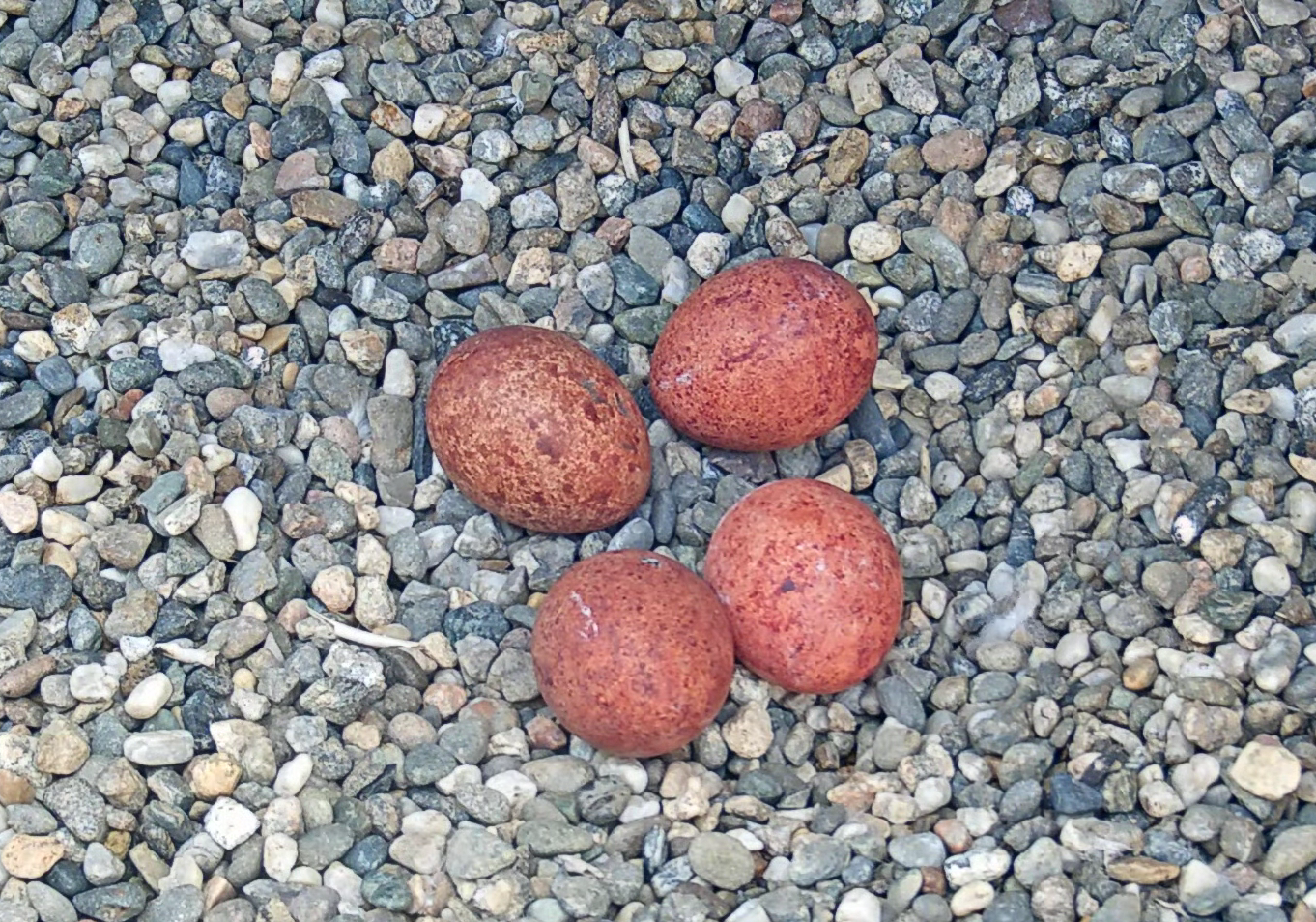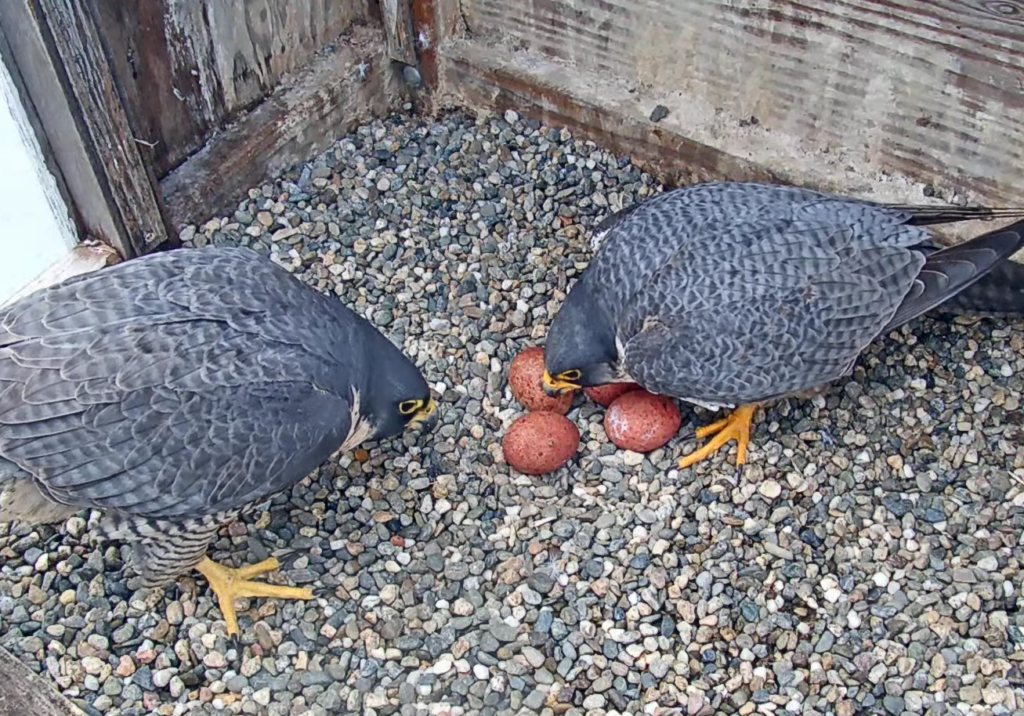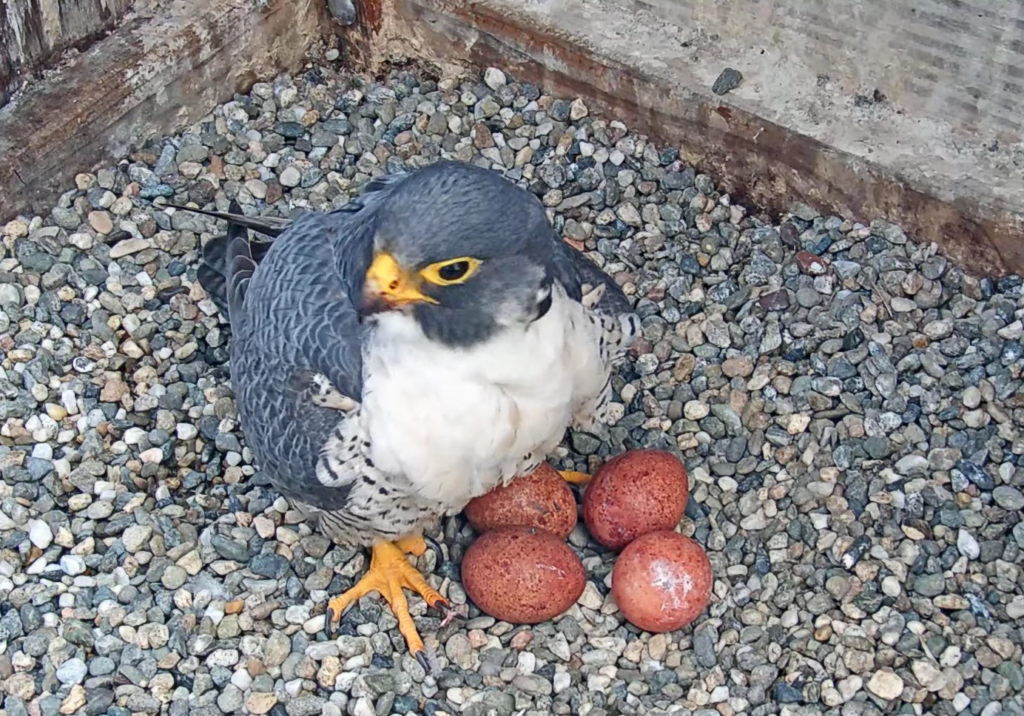UC Berkeley falcons Annie and Archie welcome four eggs to their nest
Cal Falcons warns drones to stay away from the tower, a sensitive wildlife habitat.

Cal Falcons for UC Berkeley
March 25, 2024
It’s spring again on UC Berkeley’s Campanile, where peregrine falcons Annie and Archie are tending to four new speckled, rust-colored eggs. This year’s eggs — Annie has raised young on the tower each year since 2016 — arrived about two days and four hours apart.
Cal Falcons scientists say hatching is expected April 23 or 24. Until then, Annie’s new mate, Archie, who replaced his predecessor, Lou, in early January, will do most of the hunting for Annie and eventually for the chicks.
Archie appears adept at caring for a growing family of falcons. He hunts for Annie’s meals and stores his finds in a larder. He’s even been viewed “enfluffeling” — a very unscientific term for the motions a bird makes while settling its body on top of eggs to incubate them — via one of the tower webcams.
“We don’t know Archie’s history and have kind of assumed he’s a new dad, because it’s not super-common for an experienced bird to move into a new territory,” said Sean Peterson, an ecologist with Cal Falcons. “However, Archie has picked up his duties very quickly and with little hesitation. It’s possible he’s done this before!”

Cal Falcons for UC Berkeley
Archie is more confident about incubating eggs than Alden, Annie’s mate until November 2022, Peterson added, but not quite as enthusiastic as Lou, “who Annie often had to cajole off the eggs.”
Annie typically lays four eggs but has never hatched more than three chicks a year. Hatch Day 2024 will be celebrated on Wednesday, April 24, at an all-day party at the Berkeley Art Museum and Pacific Film Archive, with falcon experts there to answer questions and free stickers for visitors.
Banding of the chicks, and a naming contest for them, will be scheduled after the eggs hatch, as will the likely time the chicks will fledge. Young male peregrine falcons generally fledge — acquire the feathers necessary for flight and eventually leave the nest — before females.
Meanwhile, on Alcatraz Island, Annie’s offspring Lawrencium (Larry) also has produced four eggs this month — about two weeks before her mother. “We should hopefully be getting news from the National Park Service about chicks at that site in a couple weeks,” said Peterson. “Avian flu has been continuing to circulate, so hopefully all the falcons will stay safe and healthy.”

Unfortunately, another danger is present — and very close to Annie and Archie’s nest. A couple of drones have flown around the bell tower already this year, and some have gotten “exceptionally close,” said Peterson.
“The Campanile is a very enticing target for a lot of drone pilots,” he said. “It’s an incredibly iconic structure, with amazing views of the Bay Area. But it is also sensitive wildlife habitat, and drones have injured or killed adult birds or caused nest abandonment in the past at other nest sites.
“The last thing anyone wants is to lose this nest site due to someone flying too close with a drone. We try to keep people informed as best we can about campus policy on drones, as well as about rules about approaching and harassing wildlife.”
Berkeley’s policy states that unauthorized drone flights on the main campus are banned, and that those who violate federal law, the UC policy or the Berkeley policy pertaining to drones will be subject to disciplinary action.
Members of the community should contact UCPD to report violations in a timely manner.
NOTE: There will be an authorized drone flight on campus this morning (Monday, March 25), but it will not be near the Campanile, and the drone should not be bothersome to the nesting birds. Monitors will be on campus, however, and the flight will stop if the falcons react to it.
In addition to three webcams on the tower, falcon fans can follow Annie and Archie’s daily lives via Cal Falcon’s Instagram, Facebook and X accounts.